This article first published at isra-night-journey-and-miraj-ascension">www.resulullah.org
One of the greatest miracles of the Prophet is the miracle of Night Journey (Isra) and Ascension (Miraj), which is mentioned and narrated by the Quran, authentic hadith resources and history resources. First, we will explain how the miracle of Night Journey and Ascension took place quoting from the verses of the Quran, hadiths and narrations from authentic resources; then, we will give answers to the questions that can come to the mind regarding the issue.
Lexically “isra” means walking at night, traveling at night [1], “miraj” means rising, going up to a high place.[2] The events of Night Journey and Ascension took place on the twelfth year [3] of the prophethood of Hazrat Muhammad (pbuh) in Makkah. [4]
The event took place as follows in brief: On the 27th night of the month of Rajab [5], acting upon the call from God Almighty and guided by Gabriel (Jibril), the Prophet (pbuh) went from the Kaaba in Makkah to Masjid al-Aqsa in Jerusalem and then to the sky, to the high realms and to the presence of God.
Also Read: Imaam Yakhsyallah: Nurture Love for the Prophet, One Will Be with Whom One Loves
It is stated in the chapters of al-Isra and an-Najm in the Quran how the miracle of Night Journey and Ascension took place. The verses regarding the issue are as follows:
“Glory to (Allah) Who did take His Servant for Journey by night from the Sacred Mosque to the Farthest Mosque whose precincts We did bless― in order that We might show him some of Our Signs: for He is the one Who heareth and seeth (all things).” [6]
“While he was in the highest part of the horizon: Then he approached and came closer, And was at a distance of but two bow-lengths or (even) nearer; So did (Allah) convey the inspiration to His Servant (conveyed) what He (meant) to convey. The (Prophet’s) (mind and) heart in no way falsified that which he saw. Will ye then dispute with him concerning what he saw? For indeed he saw him at a second descent. Near the Lote-tree beyond which none may pass: Near it is the Garden of Abode. Behold, the Lote-tree was shrouded (in mystery unspeakable!) (His) sight never swerved nor did it go wrong! For truly did he see of the Signs of his Lord the Greatest!.” [7]
How did the Ascension take place?
Also Read: Thanksgiving: An Islamic Perspective
The Prophet (pbuh) went from the Kaaba (Makkah) to Masjid al-Aqsa (Jerusalem) on a mystical creature similar to a horse called Buraq.[8] Before he reached Jerusalem, he stopped by the place of Hazrat Moses (pbuh) and performed a two-rak’ah prayer there;[9]then, he reached Masjid al-Aqsa.[10] There, he was met by a group of prophets among which there were Jesus (Isa), Moses (Musa) and Abraham (Ibrahim).[11] Hazrat Muhammad (pbuh) led the other prophets in a prayer of two-rak’ahs.[12]
After that, the Prophet (pbuh) was brought two bowls; one of them had wine and the other had milk.[13] He was told, “Have either of them!”[14] The Prophet (pbuh) chose the milk.[15] Jibril said to the Prophet (pbuh), “You chose the natural one [16]; if you had chosen the wine, your ummah would have gone astray after you. [17] You were led to the natural state by choosing the milk; your ummah was led to the natural state, too. Wine was rendered haram for you!” [18]
Then he ascended into the heavens, the cosmos. He stopped by all of the layers of the sky.[19] He met the prophets Adam, Yahya (John), Isa, Yusuf, Idris (Enoch), Harun (Aaron) Musa and Ibrahim (peace be upon them all) respectively; they said to him, “Welcome!” and congratulated him. [20] Then, he visited Bayt al-Mamur (the much frequented house), which seventy thousand angels visited every day. [21]
After that, he went to Sidra al-Muntaha (Lote Tree of the Extremity) together with Jibril.[22] Sidra al-Muntaha is a tree whose root is in the sixth layer of the sky and whose branches are over the seventh layer of the sky; it casts a shadow that covers the whole sky and Paradise; its leaves are like elephant ears and its fruits are like large jars.[23]
Also Read: Achieving the Position of Fasting Expert with Kindness of Morality
Rafraf and the Meeting in the Furthermost Place
Jibril took the Prophet to higher places; eventually, he took the Prophet to such a high place that the Prophet started to hear the pens writing people’s actions.[24] The Prophet (pbuh) saw that a very green Rafraf (silk bed) covered the horizon. The Prophet (pbuh) sat on Rafraf.[25] Jibril left the Prophet there. The Prophet was elevated and approached to his Lord, who is Aziz (Mighty and Strong) and Jabbar (Compelling).[26]
The Prophet started to hear the order of his Lord, “Do not be afraid, O Muhammad; approach!” In the end, he reached the place that nobody had reached before, attaining divine acceptance, grants and bounties.[27] According to the narration of Ibn Abbas, the Prophet said, “I saw my sublime Lord!”[28]
In Miraj, the Prophet (pbuh) gave the worshipping of all creatures to God Almighty as a gift instead of greetings. The talk of the Prophet (pbuh) with God Almighty consists of the words of tahiyyat, which is recited during prayer, which is the ascension of believers. Here is the meaning of that talk:
Also Read: The Power of Charity in Ramadan
The Prophet (pbuh) said to God Almighty,
“All kinds of greetings, prayers and goodness belong to Allah.”[29]Its meaning is “I present all of the greetings and glorification of the beings with their states and tongues, all of the natural blessedness and glorification of all blessed things like seeds and semen, all of the worshipping of conscious beings like human beings, all of the worshipping and glorification of all prophets and saints to you as a gift; they all belong to you.”
Upon this greeting, God Almighty said to His Prophet (pbuh), “Peace, the mercy of Allah and His blessings be on you, O Prophet!” Thereupon, the Messenger of Allah (pbuh) said,“Peace be on us and on the righteous servants of Allah.” Jibril witnessed this talk at Sidra al-Muntaha when Allah ordered him to be a witness by saying, “I bear witness that there is no god but Allah. And I bear witness that Muhammad is His slave and Messenger.”[30]
It is sunnah to recite those words that were uttered during the conversation in Ascension in prayer, which is regarded as the ascension of believers. Thus, all believers have the opportunity of presenting all of the worshipping of the unconscious and conscious beings to Allah within their own worshipping.
Also Read: Ramadan Brings the Change
Things that were Given to the Prophet in Ascension
The Prophet (pbuh) was given three things as a result of the encounter in Miraj:
1. Five daily prayers equal to the reward of fifty daily prayers.
2.The last two verses of the chapter al-Baqara.
Also Read: Ramadan, the Month of Education
3.The muqhimat (major sins) of the people from the ummah of Muhammad were forgiven except those who associated partners with Allah.[31]
As a matter of fact,, those gifts were expressed as follows in a hadith: “…Hazrat Prophet (pbuh) were given three things in Ascension: He was given five daily prayers, the last part of the chapter of al-Baqara (Amanarrasulu) and the promise that the sins ofthe people from the ummah of Muhammad would be forgiven except those who died associating partners with Allah.” (see Muslim, Iman, 279)
This glad tiding does not mean that no believers will enter Hell. It states that any sin can be forgiven and that a believer will not stay in Hell forever even if he is a sinner.
The believers who have more rewards than sins will go to Paradise directly. Those who have more sins will remain in Hell for a certain period so that they will be purified of their sins; and then they will go to Paradise.
Also Read: Come on Do I’tikaf
Allah stated:
“O Muhammad! These prayers need to be performed five times a day. However, there are ten rewards for each prayer! It means fifty prayers. [32]
I utter a word once; I will not change it! [33]
A person who intends to do a good deed but does not do it is given one reward due to his good intention; if he does it, he is given ten rewards.
Also Read: During Ramadan, Merit and Good Deeds are Multiplied
No sin is written for a person who intends to do a bad deed but does not do it; if he does it, one sin is written for him”. [34]
The following is stated in the last two verses of the chapter of al-Baqara:
The Messenger believeth in what hath been revealed to him from his Lord, as do the men of faith.
Each one (of them) believeth in Allah,
Also Read: Ramadan, The Month of Jihad
His angels,
His books,
and His Messengers
“We make no distinction (they say) between one and another of His Messengers.”
Also Read: Increasing Social Care in the Month of Ramadan
And they say: “We hear and we obey;
(We seek) Thy forgiveness,
Our Lord, and to Thee is the end of all journeys.”
On no soul doth Allah place a burden greater than it can bear.
It gets every good that it earns
and it suffers every ill that it earns.
(Pray): “Our Lord! condemn us not if we forget or fall into error;
our Lord! Lay not on us a burden like that which Thou didst lay on those before us;
Our Lord! lay not on us a burden greater than we have strength to bear.
Blot out our sins and grant us forgiveness.
Have mercy on us.
Thou art our Protector;
help us against those who stand against faith!” [35]
Muqhimat means major and dangerous sins that lead man to Hell. [36]
Once, the Prophet (pbuh) said,
“Beware seven things that lead man to destruction!”
“O Messenger of Allah! What are those dangerous things?” asked his Companions.
The Prophet said,
“To associate partners with Allah,
To cast a spell,
To kill a person unjustly, which was forbidden by Allah,
To devour interest (usury),
To devour the money of the orphans,
To escape from the battlefield,
To slander Muslim women who are chaste and never think of committing fornication that they have committed fornication!” [37]
Paradise is Shown to the Prophet (pbuh)
After Allah revealed to the Prophet what He was to reveal, the Prophet (pbuh) was taken to Paradise by Jibril. [38]
The width of Paradise is as much as the sky and what is under it. [39] The Prophet (pbuh) saw villas made of pearl, ruby and chrysolite [40]; he noticed that the soil of Paradise smelled musky. [41] The Prophet (pbuh) also saw a river next to which there were domes made of hollow pearls [42]; it was flowing on pearl and ruby stones and on musk. [43]
The Prophet (pbuh) asked, “O Jibril! What is this?” Jibril said, “It is the river Kawthar, which Allah gave you!” The water of the river Kawthar was tastier than honey and whiter than milk.[44]
Hell is shown to the Prophet (pbuh)
Among the smiling angels that met the Prophet (pbuh) in the sky of the world, there was an angel called Malik, angel of Hell, who never smiled.
When the Prophet asked Jibril who he was and found out about his identity, he said to Jibril,
“Will you order him to show me Hell?”
Jibril said,
“All right!” He said to Malik,”OMalik! Show Hell to Muhammad (pbuh)!”
When Malik unveiled the covering of Hell, it started to boil so much that the Prophet (pbuh) thought it would capture and burn everything. He said to Jibril,
“O Jibril! Order Malik to return it to its previous state!”
Jibril ordered Malik to return it to its previous state. He said to Hell,
“Calm down!”
When Hell returned to its place, Malik veiled its covering again.[45]
The Prophet saw the tortures of thirst, chains of torture, torture snakes and scorpions and some other tortures.[46]
The Prophet (pbuh) stated the following in a hadith:
“If you knew what I know, you would laugh a little and cry a lot.”[47]
The Prophet (pbuh) Returns to Makkah
The Prophet (pbuh) mounted on Buraq, which he had tied to the gate of the mosque Masjid al-Aqsa, and returned to Makkah. The Night Journey and Ascension of the Prophet took place one night between the night prayer and the morning prayer.[48]
Sons of Abdulmuttalib Search for the Prophet (pbuh)
When Sons of Abdulmuttalib could not find the Prophet on the night of Ascension, they went out to look for him.
Hazrat Abbas went as far as Zituwa. He called out loudly,
“O Muhammad! O Muhammad!”
When the Prophet (pbuh) replied, “Yes!”, Hazrat Abbas said,
“O my brother’s son! You put your tribe into trouble last night. Where were you?” The Prophet (pbuh) said,
“I went to Bayt al-Maqdis.” Hazrat Abbas asked:
“Within one night? The Prophet (pbuh) said,
“Yes. I went and returned within one night!”Hazrat Abbas said,
“I hope only good things have happened to you!” The Prophet (pbuh) said,
“Yes, only good things have happened to me!”[49]
In the morning, he told Makkans about Ascension near the Kaaba.[50] They asked for evidence. He told them about the caravans he had seen on the way. The Qurayshis went out of Makkah to meet the caravans. They saw the caravans in the same state as the Prophet had informed them but they did not embrace Islam.[51]
However, they asked the Prophet (pbuh) proof after proof that he went there. When the Prophet (pbuh) told them that he went to Masjid al-Aqsa in Jerusalem, the Qurayshis objected to him by saying, “How could Muhammad go to a place that takes a month to go and return in one night?” Then, those who had seen Masjid al-Aqsa before asked him,“Can you describe Masjid al-Aqsa to us?”
The Prophet narrated the talk between them as follows:
“I was very tired of their denial and questions. In fact, I had not experienced such difficulty until that moment. Just then, Allah showed me Baytu’l Maqdis. While looking at it, I described every detail one by one. They even asked me, “How many doors does Baytu’l Maqdis have?” However, I had not counted its number of doors. When I saw Baytu’l Maqdis across from me, I began to look at it, count each of its doors and told them the number.”
Thereupon, the polytheists said, “By God, you perfectly and correctly described it.”Nevertheless, they still did not become Muslims.[52]
Meanwhile, Hazrat Abu Bakr came; the polytheists informed him about the situation. Hazrat Abu Bakr said, “If he said this, then it is undoubtedly true..”, confirming what he said. Then, Hazrat Abu Bakr was given the title “Siddiq (the Truthful)” by the Prophet.[53]
Why did the Prophet Ascend?
A sultan has two kinds of talks. The first one is when the sultan rings a citizen and talks to him about a trivial matter. The second is when he talks to his special envoy as the head of the state, caliph and an administrator of the nation and in order to convey his commands everywhere and send his decrees.
As it is seen in this example, Allah has two kinds of talks with his slaves. One is special and little talk, the other is general and comprehensive talk. An example for the first one is Allah’s special and minute inspiration to some saints.
However, the fact that our Prophet (pbuh) as a person with the highest and greatest rank over all of the saints talks to Allah, who is the Creator of all of the beings, is an example to the second and perfect type of talk.
Our prophet’s mission has two ways: one from people to Allah, the other from Allah to people. One is the esoteric, saintly aspect of Ascension, the other is the apparent, prophetic aspect.
That is, the Prophet (pbuh) ascended to the presence of Allah on behalf of us and presented all of the worshipping, prayers, glorification and mentioning of Allah of human beings and all of the other beings to Allah as a whole just as a soldier reports to his commander. From this point of view, Miraj is ascension from people and beings to Allah. From another point of view, the Prophet brought us what Allah wants from, His slaves, us, His orders and prohibitions; like five prayers, the essence of all worshipping, as the gift of Ascension.
How can the Prophet (pbuh) talk to Allah?
Question:“What is the meaning of the Prophet’s talk to Allah, who is closer to us than everything, after traveling a distance that would take of thousands of years and after passing seventy thousand veils?”
God Almighty is closer to everything than everything else, but everything is limitlessly far from him. For instance, if the sun had a mind like man and wanted to talk to us, it would do so through a mirror in our hand. On the other hand, we get close to sun with our eye, which is a kind of mirror. As a matter of fact, the sun is 150 000.000 km away from us; we can never get close to it. In order to get one degree close to the sun, we should grow as big as the moon. That is impossible. As it is seen in the example, Allah is actually close to everything but everything is limitlessly far from him. However, by the grace of Allah, the Prophet (pbuh) ascended and reached the presence of Allah by traveling through thousands of veils in a moment and passing all spiritual levels.
How can a man ascend to heavens?
Question: “Is there an example of it? A plane can only fly 10-15 thousands meters high, a spaceship can only reach the moon or Venus. How can a man go to a distance of millions of meters and return in such a very short time as a few minutes?”
Our globe, that is the world, rotates a distance of about 188 hours in a minute; it covers the distance of twenty-five thousand years in a year. Can the Power that makes it cover great distances in a short time and rotate it like a catapult stone not take a man to the highest point of the heavens? Can the Wisdom that makes the earth, the very heavy thing, rotate round the sun not take the body of a man up to His throne like a lightning?
Could the Prophet not have traveled there only by his soul?
Question: “Why did he ascend? Why was it necessary? Would it not have been enough if he had ascended by his soul and heart?”
It is quite reasonable that Allah invited the Prophet (pbuh) there to show him the beauties of the visible and invisible realms, the factory of the universe and its center, the results of men’s deeds and worshipping in the hereafter. It was necessary for him to travel there not only by his soul and heart but also by his body.
It is a necessity of the intelligence and wisdom that his eye, which is the key of the visible world, and his ear, which is the key of the audible world, his body, which is like the tool and machine that undertakes numerous tasks of his soul, all had to go up to the throne of Allah with him.
Besides, God Almighty makes the body a friend of the soul. The body is the base for many tasks of worshipping, limitless pleasures and pains.
Therefore, the holy body will accompany the soul. Since the body will be together with the soul in Paradise, it is the very wisdom that the body of the Prophet (pbuh) will accompany his soul to the lote tree of the furthest point, which is the trunk of Paradise of Abode.
If our prophet had ascended by his soul only, it would not have been a miracle. Saints could ascend by their spirits and hearts to those realms.
How did the Prophet go and come back in such a short time?
Question:“Is it logically possible to go to and come back from a distance of thousands of years in a few minutes?”
The rate of movement and speed differs in the art of God Almighty. The speed of sound and the speed of light, the speed of electricity, and even the speed of soul and imagination are all completely different from one another. The speed of planets also differs. For instance, while the speed of light is 300.000 km/sec, the speed of sound is 360 km/sec.
How can it be logically impossible that the subtle body of our Prophet becomes subject to his soul and moves with the speed of the soul?
Sometimes when a man sleeps for only ten minutes, he may do something worth a year. When a dream a man sees, the words he hears in the dream, the words he utters in the dream are added, one day or maybe more can be necessary for them when he is awake.
That is, the periods of time can change from person to person; one day for a man may be like one year for another.
Thus, our Prophet (pbuh) rode on Buraq, traveled the universe like a lightning, reached the presence of Allah, attained the honor of talking to his Lord, saw His beauty, received His orders and returned.
Is there an event like Ascension?
Question:“It is possible for our Prophet to ascend. However, not all of the possible things take place. Is there anything similar to it so that we shall accept it?”
There are a lot of examples of Ascension: A man can ascend to the planet Neptune in a second with his eye. A scientist can reach behind the stars in a minute by riding the laws of astronomy. A believer can reach the divine presence by putting the actions in the prayer on his thought and riding past the universe, through a kind of ascension.
A saint whose eye of the heart is open can attain divine secrets in forty days. It is even reported that some saints like Abdulqadir Gaylani and Imam Rabbani reached the throne of Allah in a minute by their souls.
Angels, who have luminous bodies, go to the highest point of the heaven and come back in a moment.
In Paradise, believers can reach the gardens of Paradise in a very short time.
Those examples show that it is quite reasonable and doubtless that the sultan of all of the saints, the imam of all of the believers, the chief of all of the people of Paradise and the best accepted person by angels, the most honorable Messenger (pbuh) will ascend, travel and see all of the realms in a moment.
Gifts That were Sent down through Ascension
When we narrated how the miracle of Ascension took place, we mentioned the gifts that were sent down to us through Ascension. We would like to summarize the importance of those gifts for us here:
Firstly:The Prophet (pbuh) saw all of the realities of belief with his own eyes. He saw angels, Paradise, the hereafter, even the beauty of Allah with his eyes. That exalted person who never told a lie and who never broke a promise says the following to the souls of the believers spiritually:
“I saw angels, the hereafter that you believe, the luminous beauty of your Lord with my eyes; these fundamentals of belief are present, do not hesitate or doubt about them.”
Thus, believers attained the happiness of achieving such a limitless belief.
Secondly:Man is curious about everything. He searches whether there is life in the moon or not. As a matter of fact, the biggest stars occupy a space as tiny as a fly in the realm of that Pre-eternal Sultan. Believers wonder, “What does our Lord want from us? What should we do to make our Lord be pleased with us? If only we had the chance and talked to Allah and asked him what he wanted from us” While believers were wondering like that, the Chief of the two worlds, Hazrat Muhammad (pbuh) took the good deeds that the Pre-eternal and Post-eternal Sultan would be pleased with as the fruits of Ascension and presented them to man as gifts. These gifts are prayers, and other fundamentals and worshipping of Islam.
Thirdly:The Prophet (pbuh) obtained the key of the treasury of eternal happiness, and brought it as a gift to jinn and men. He saw Paradise with his own eyes and witnessed the existence of eternal happiness and informed us about the good news. When a man who is about to be hanged is forgiven and given a palace near the sultan, he becomes extremely happy.
Similarly, this good news for all of men and jinn is so important and valuable.
Fourthly:The Prophet (pbuh) had the blessing of seeing the beauty of Allah during Ascension. He brought the good news that believers would attain in Paradise. He said, “As you see the full moon clearly with your eyes so will you see your Lord clearly in Paradise.” [54], bringing that pre-eternal good news as a gift to us.”
Fifthly:Man’s being the precious fruit of the universe and the petted beloved of the Owner of the Universe was understood through Ascension. This fruit raises man, who is a small being and a weak creature, to a rank so elevated that it confers on him a rank of pride above all the beings in the universe. If it is said to an ordinary private, “You have been promoted to the rank of field-marshal,” how delighted he will be.Similarly, when it is said to the weak, eternal man who is always punished with separation and declining, “You will attain the mercy of the All-Compassionate and the Merciful One in an eternal never-ending Paradise”, he reaches such a great rank. In Paradise, he will make excursions and tours with the speed of imagination and breadth of the spirit and with the mind in accordance with all the desires of the heart in the eternal realm of Allah. He will also attain the blessing of seeing the beauty of Allah. Such a man’s heart and soul will definitely have so much joy. This fruit of Ascension is man’s greatest wish and goal.(R04/R03)
———————————————————————————————————————————————————————
[1]Fayruzabadi, Qamusu’l-Muhit, V. 4, p. 343.
[2]Ibn Athir, Nihaya, V. 3, p. 203.
[3]Abu’l-Faraj Ibn Jawzi, al-Wafa, V. 1, p. 218; Ibn Sayyid, Uyunu’l-Athar, V. 1, p. 1 48; Badruddin Ayni, Umdatu’l-Qari, V. 4, p. 39; Diyarbakri, Khamis, V. 1, p. 306.
[4]Ibn Sa’d, Tabaqat, V. 1 , p. 214; Balazuri, V. 1 , p. 255; Bayhaqi, V. 2, p. 354; Ibn Abdilbarr, V. 1, p. 40; Abu’l-Faraj, V. 1, p. 219; Ibn Athir, Kamil, V. 2, p. 51; Qurtubi, Tafsir, V. 15, p. 216; Ibn Sayyid, V. 1 , p. 148; Abu’l-Fida, Tafsir, V. 3, p. 22; Badruddin Ayni, Umda, V. 4, p. 39.
[5] Abu’l-Faraj, V.1, p. 219.
[6]al-Isra, 17/1.
[7]an-Najm, 53/7-18.
[8]Ahmad b. Hanbal, V. 3, p. 148; Bukhari, V. 4, p. 248; Muslim, V. 1, p. 145; Tirmidhi, V. 5, p. 301; Bayhaqi, V. 2, p. 362-363; Baghawi, V. 2, p. 177; Ibn Athir, Jamiu’l-Usul, V. 12, p. 53; Abu’l-Fida, V. 3, p. 8.
[9]Masaf, Sunan, V.1, p. 221-222; Ibn Athir, Kamil, V. 2, p. 52; Abu’l-Fida, Tafsir, V. 3, p. 6.
[10]Nasai, V. 1, p. 222; Qadi Iyad, V. 1, p. 136.
[11]Ibn Sa’d, Tabaqat, V. 1 ,p.214; Abu’l-Fida, al-Bidaya wa’n-Nihaya, V. 3, p. 109-110.
[12]Ibn Ishaq, Ibn Hisham, V. 2, p. 39; Abu’l-Fida, V. 3, p. 110.
[13]Ibn Ishaq, Ibn Hisham, c 2, p. 39; Abdurrazzaq, Musannaf, V. 5, p. 329; Ibn Abi Shayba, Musannaf, V. 14, p. 302; Ahmad b. Hanbal, Musnad, V. 3, p. 148; Bukhari, Sahih, V. 4, p. 141; Muslim, Sahih, V. 1, p. 145; Tirmidhi, Sunan, V. 5, p. 300; Darimi, Sunan, V. 2, p. 36; Balazuri, Ansabu’l-Ashraf, V. 1, p. 256; Tabari, Tafsir, V. 15, p. 15; Bayhaqi, Dalail, V. 2, p. 387; Qadi Iyad, V. 1, p. 136; Ibn Athir, Jamiu’l-Usul, V. 12, p. 53; Ibn Athir, Kamil, V. 2, p. 52; Ibn Sayyid, V. 1, p. 144; Dhahabi, Tarikhu’l-Islam, p. 244, Abu’l-Fida, V. 3, p.109-110.
[14]Abdurrazzaq, V. 5, p. 329; Ahmad b. Hanbal, V. 2, p. 282; Bukhari, V. 4, p. 141; Tirmidhi, V. 5, p. 300; Tabari, Tafsir, V.1 5, p. 12.
[15]Ibn Ishaq, Ibn Hisham, V. 2, p. 39; Abu’l-Fida, V. 3, p. 110.
[16]Muslim, Sahih, V. 1, p. 145; Ibn Athir, Jamiu’l-Usul, V. 12, p. 53; Ibn Sayyid, Uyunu’l-Athar, V. 1, p. 144.
[17] Abdurrazzaq, V. 5, p. 330; Ahmad b. Hanbal, V. 4, p. 141; Tirmidhi, V. 5, p. 300; Tabari, Tafsir, V. 1 5, p. 15; Bayhaqi, V. 2, p. 357; Ibn Athir, V. 2, p. 52; Dhahabi, p. 244.
[18]Ibn Ishaq, Ibn Hisham, V. 2, p. 39; Tabari, Tafsir, V. 15, p. 15; Abu’l-Fida, V. 3, p. 110.
[19]Ibn Ishaq, Ibn Hisham, Sirah, V. 2, p. 45; Tabari, Tafsir, V. 15, p. 14; Abu’l-Fida, al-Bidaya wa’n-Nihaya, V. 3, p. 111; Qastalani, Mawahibu’l-Ladunniya, V. 2, p. 24.
[20]Ibn Abi Shayba, V. 14, p. 303; Ahmad b. Hanbal, V. 3, p. 148; Muslim, Sahih, V. 1, p. 146; Bayhaqi, Dalailu’n-Nubuwwa, V. 2, p. 383; Baghawi, Masabihu’s-Sunna, V. 2, p. 179; Qadi Iyad, ash-Shifa, V. 1, p. 137; Ibn Athir, Musannaf, Jamiu’l-Usul, V. 12, p. 53; Ibn Sayyid, Uyunu’l-Athar, V. 1, p. 144.
[21]Ibn Abi Shayba, Musannaf, V. 14, p. 303-304; Ahmad b. Hanbal Musnad, V. 3, p. 148-149; Muslim, Sahih, V. 1 , p. 146-147; Bayhaqi, Dalailu’n-Nubuwwa, V. 2, p. 384; Baghawi, Masabihu’s-Sunna, V. 2, p. 179; Qadi Iyad, ash-Shifa, V. 1, p. 137; Ibn Athir, Jamiu’l-Usul, V. 12, p. 53-54; Ibn Sayyid, Uyunu’l-Athar, V. 1, p. 144.
[22]Ahmad b. Hanbal, V. 4, p. 207-208; Bukhari, Sahih, V. 4, p. 249.
[23]Ibn Abi Shayba, V. 14, p. 304; Muslim, V. 1, p. 146; Tabari, V. 27, p. 54; Bayhaqi, V. 2, p. 384; Qadi Iyad, ash-Shifa, V. 1, p. 137; Ibn Athir, Jamiu’l-Usul, V. 12, p. 54; Ibn Sayyid, V. 1,p.144; Dhahabi, p. 266.
[24]Ibn Sa’d, Tabaqatu’l-Kubra. V. 1, p. 213; Bukhari, Sahih, V. 1, p. 92; Muslim, Sahih, 11, p. 149; Bayhaqi, V. 2, p. 381; Qadi Iyad, V. 1, p.140, 148; Ibn Athir, V. 12, p. 56; Ibn Sayyid, V. 1.P.145; Dhahabi, p. 254.
[25]Ahmad b. Hanbal, V. 1, p. 449; Bukhari, V. 6, p. 51; Tabari, V. 27, p. 57, Bayhaqi, V. p. 372; Qurtubi, V. 17, p. 98.
[26]Bukhari, V. 8, p. 204; Tabari, V. 27, p. 45; Ibn Athir, V. 12, p. 51; Ibn Qayyim, Zadu’l-Maad, V. 2, p. 53; Qurtubi, V. 17, p. 98; Dhahabi, p. 267; Abu’l-Fida, al-Bidaya wa’n-Nihaya, V. 3, p. 112.
[27]Qadi Iyad, V. 1, p. 160; Diyarbakri, V. 1, p. 312.
[28]Qadi Iyad, V. 1, p. 163.
[29]Bukhari, Adhan: 148, 150; al-Amal Fi’s-Salat: 4, Isti’dhan: 3, 28, Da’awat: 16, Tawhid: 5; Muslim, Salat: 56, 60, 62; Abu Dawud, Salat: 178; Tirmidhi, Salat: 100, Nikah: 17; Nasai, Tatbiq: 23, Sahw: 41, 43-45, 56, 100-104; Ibn Majah, Iqama: 24; Nikah: 19; Darimi, Salat: 84, 92; Muwatta’, Nida’: 53, 55; Musnad, 1:292, 376, 382-4:409.
[30]Badiuzzaman Said Nursi, Şualar, Altıncı Şua, p.92; On Beşinci Şua, p.642-646.
[31]Ahmad b. Hanbal, Musnad, V. 1, p. 422; Muslim , Sahih, V. 1, p. 157; Tirmidhi, Sunan, V. 5, p. 393-394; Nasai, Sunan, V. 1, p. 224; Bayhaqi, Dalailu’n-Nubuwwa, V. 2, p. 373; Baghawi, Masabihu’s-Sunna, V. 2, p.179; Qadi Iyad, ash-Shifa, V. 1, p. 1 42; Ibn Athir, Jamiu’l-Usul, V. 12, p. 57; Qurtubi, V. 17, p. 94; Dhahabi, p. 255; Diyarbakri, Khamis, V. 1, p. 312.
[32]Ibn Abi Shayba, Musannaf, V. 14, p. 304; Ahmad b. Hanbal, V. 3, p. 149; Muslim, V. 1, p. 146-147; Bayhaqi, Dalail, V. 2, p. 384; Qadi Iyad.V.1, p. 138; Ibn Athir, V. 1 2, p. 54; Dhahabi, p. 266.
[33]Bukhari, Sahih, V.1, p. 93; Muslim, Sahih, V. 1 ,p.149; Ibn Athir, Jamiu’l-Usul, V. 12, p. 57.
[34]Ibn Abi Shayba, Musannaf, V. 14, p. 304-305; Ahmad b. Hanbal, V. 3, p. 149; Muslim, V. 1, p. 147; Bayhaqi, V.2, p. 384; Qadi Iyad, V. 1, p.138; Ibn Athir, V. 12, p. 54.
[35]al-Baqara, 2/285-286.
[36]Ibn Athir,Nihaya, V. 4. p.19.
[37]Abdurrazzaq, Musannaf, V. 11 , p. 17; Bukhari, Sahih, V. 195; Muslim, Sahih, V. 1, p. 92; Bayhaqi, Sunanu’l-Kubra, V. 8, p. 20, 249.
[38]Bukhari, Sahih, V. 1 , p. 93; Muslim , Sahih, V. 1, p. 149; Baghawi, Masabihu’s-Sunna, V. 2, p. 179; Ibn Athir, Jamiu’l-Usul, V. 12, p. 57; Ibn Sayyid, Uyunu’l-Athar, V. 1 , p. 145.
[39]Aal-i Imran, 3/133.
[40]Ibn Athir, Kamil, V. 2, p. 55.
[41]Bukhari, V. 1, p. 93; Muslim, V. 1, p. 149; Baghawi, V. 2, p. 179; Ibn Athir, V. 12, p. 57; Ibn Sayyid, V. 1, p. 145; Dhahabi, Tarikhu’l-Islam, p.260.
[42]Ahmad b. Hanbal, Musnad, V. 3, p. 263; Bukhari, Sahih, V. 6, p. 92; Tirmidhi, Sunan, V. 5, p. 449; Tabari, Tarikh, V. 2, p. 211.
[43]Ibn Athir, Kamil, V. 2, p. 55.
[44]Ahmad b. Hanbal, V. 3, p. 263; Bukhari, V. 6, p. 92; Tirmidhi, V. 5, p. 449; Tabari, V. 2, p. 211; Ibn Athir, V. 2, p. 55; Tirmizi, V.5, p. 450; Tabari, V. 2, p. 211; Ibn Athir, Kamil, V. 2, p. 55.
[45]Ibn Ishaq, Ibn Hisham, Sirah, V.2, p. 45-46.
[46]Ibn Athir, Kamil, V. 2, p. 55.
[47]Ahmad b. Hanbal, Musnad, V. 3, p. 210; Bukhari, Sahih, V. 5, p. 190; Tirmidhi, Sunan, V. 5, p. 557; Ibn Majah, Sunan, V. 2, p. 141; Darimi, Sunan, V. 2, p. 216; Hakim, Mustadrak, V. 4, p. 320; Bayhaqi, Sunanu’l-Kubra, V. 7, p. 52; Ibn Sayyid, Uyunu’l-Athar, V. 2. p. 335; Dhahabi, Tarikhu’l-Islam. p. 480.
[48]Ibn Ishaq, Ibn Hisham, V. 2, p.43; Ibn Sa’d, Tabaqatu’l-Kubra, V. 1, p. 214-215; Tabari, Tafsir, V. 15, p. 2; Dhahabi, Tarikhu’l-Islam, p. 272; Abu’l-Fida, V. 3, p. 110-111; Suyuti, Khasaisu’l-Kubra, V. 1, p. 439; Ibn Athir, Kamil, V. 2, p. 56.
[49]Ibn Sa’d, Tabaqatu’l-Kubra, V. 1, p.214; Dhahabi, Tarikhu’l-Islam, p. 272.
[50]Ibn Ishaq, Ibn Hisham, Sirah, V. 2, p. 43; Ibn Sa’d, Tabaqat, V. 1 , p. 215; Ibn Sayyid, Uyunu’l-Athar, V. 1, p. 141; Dhahabi, Tarikhu’l-Islam, p. 245-246; Abu’l-Fida, al-Bidaya wa’n-Nihaya, V. 3, p. 110.
[51]Diyarbakri, Khamis, V. 1, p. 315-316; Abu’l-Fida, Tafsir, V. 3, p. 22; Ibn Athir, Kâmil, V. 2, p. 56-57; Ibn Sayyid, V.1, p. 142; Ibn Ishaq, Ibn Hisam, Sirah, V. 2, p. 44; Dhahabi, Tarikhu’l-Islam, p. 243; Ibn Sa’d, Tabaqatu’l-Kubra, V. 1, p. 215.
[52]Ibn Abi Shayba, Musannaf, V. 14, p. 306; Ahmad b. Hanbal, Musnad, V. 1, p. 309; Abu’l-Faraj Ibn Jawzi, al-Wafa, V. 1 , p. 223; Dhahabi, Tarikhu’l-Islam, p. 250.
[53]Ibn Ishaq, Ibn Hisham, V. 2, p. 39-40; Dhahabi, p. 248; Abu’l-Fida, Tafsir, V. 3, p.21.
[54]Buhari, Muslim, Tirmidhi, Büyük Hadis Külliyatı-5, p. 416/10133





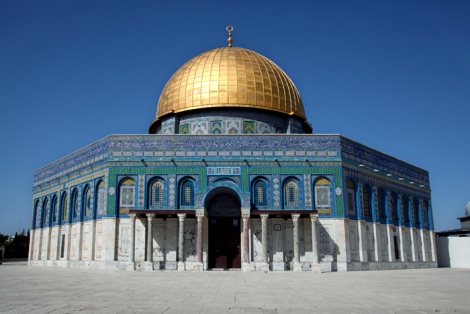




![Israeli tanks and APC’s gather by the Israeli – Lebanese border. Amid Israel’s escalating campaign against Hezbollah in Lebanon on September 30, 2024. [Erik Marmor/Getty Images]](https://en.minanews.net/wp-content/uploads/2024/10/IMG_20241001_203226-300x197.jpg)




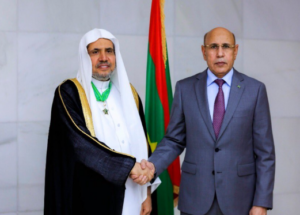
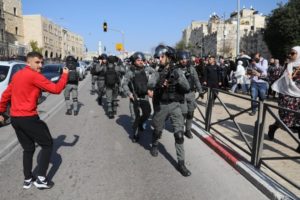
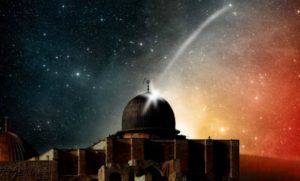
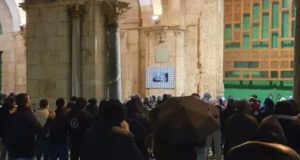
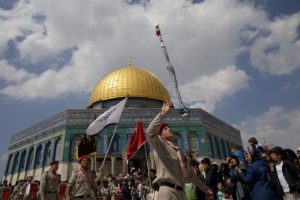
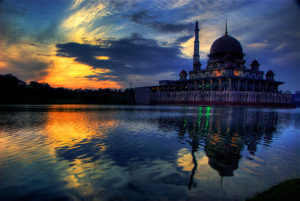














 Mina Indonesia
Mina Indonesia Mina Arabic
Mina Arabic